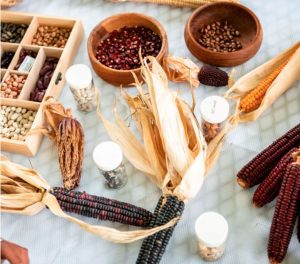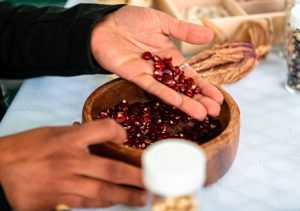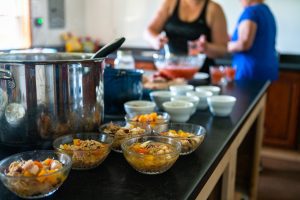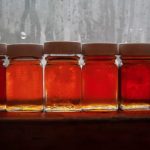Living off the Land: Season to Table Eating in Akwesasne
For centuries Mohawks have lived in harmony with mother nature and lived off the land. We were hunters, gatherers, trappers, fishermen, and farmers.
According to the Akwesasne Cultural Portrait, “The Mohawk people have always known that they are to only take what they need from Mother Earth, including plants and wildlife. They were very cautious not to deplete all of their resources to ensure that there would be enough to sustain every person in their community as well as their future generations not yet born.”
Traditional Harvest
 Mohawk men typically hunted and fished, sharing the bounty of the hunt and making sure no part of the animal went to waste. Mohawk women were the primary gatherers and collected plants in-season from forests and fields like tubers and maple syrup in the winter and berries in the summer. We were also accomplished farmers, cultivating as many as 80 varieties of corn, as well as squash and beans, which make up the sacred culinary trio the Three Sisters. Providing many key nutrients for the body, the Three Sisters were often planted together, helping to support the growth of the other plants. In the fall, the crops would be harvested and stored for the winter.
Mohawk men typically hunted and fished, sharing the bounty of the hunt and making sure no part of the animal went to waste. Mohawk women were the primary gatherers and collected plants in-season from forests and fields like tubers and maple syrup in the winter and berries in the summer. We were also accomplished farmers, cultivating as many as 80 varieties of corn, as well as squash and beans, which make up the sacred culinary trio the Three Sisters. Providing many key nutrients for the body, the Three Sisters were often planted together, helping to support the growth of the other plants. In the fall, the crops would be harvested and stored for the winter.
Living Off The Land Today
 While today many Mohawks live off of a western diet and shop in supermarkets, traditional Mohawk foods and sourcing techniques are still alive today. In Akwesasne, we are seeing a rise in seed-saving techniques and traditional gardens which reflects our agricultural roots. Nelson and Turk Jock are perpetuating the Mohawk ways and sharing them with the next generation. It can be hard to find healthy food options, and the Jocks like the way they used to eat farm-fresh foods. They both come from big families and farming and foraging were a necessity to feed the brood and maintain a healthier diet. This dynamic couple is living off the land, cultivating their own gardens, supporting community gardens, and foraging for what’s in season. Turk is also an accomplished chef, cooking fresh food from their bounty.
While today many Mohawks live off of a western diet and shop in supermarkets, traditional Mohawk foods and sourcing techniques are still alive today. In Akwesasne, we are seeing a rise in seed-saving techniques and traditional gardens which reflects our agricultural roots. Nelson and Turk Jock are perpetuating the Mohawk ways and sharing them with the next generation. It can be hard to find healthy food options, and the Jocks like the way they used to eat farm-fresh foods. They both come from big families and farming and foraging were a necessity to feed the brood and maintain a healthier diet. This dynamic couple is living off the land, cultivating their own gardens, supporting community gardens, and foraging for what’s in season. Turk is also an accomplished chef, cooking fresh food from their bounty.
“We have a job 365 days a year,” says Nelson. “We want to be more self-sufficient by growing our own food.” In the winter, the Jocks get the wood ready to collect and filter the maple syrup, a process that is all done by hand. Nelson involves the kids to pass the tradition on to future generations and to show them how much work it is. After the maple syrup, they get beans, corn, and squash seeds to plant in the greenhouse. “The Three Sisters have all the nutrients your body needs. We have protected the seeds in my family for generations and it is our job to pass them down through the generations,” Nelson says. Later they plant the summer crops like tomatoes, eggplants, and peppers, and hope to expand to fruit trees in the future.
To complement the farming, the Jocks also hunt, forage, and raise livestock, including pigs. “We forage a lot in season and I like to cook in season,” Turk says. Spring brings dandelions, leeks, fiddleheads, cowslips, and other greens that are full of nutrients. The summer brings a bounty of produce and plants like milkweed. Turk will cook these with venison or other game meat. She knows how to find mushrooms and other edible plants in the fall, but you have to be careful what you pick and where you get it from. In the winter, the community works together to make sure they are stocked up with healthy foods for the season, sharing the food they collectively hunt, gather or produce.
Cooking With Seasonal Food
 Turk says cooking seasonally isn’t just about living off the land, your body needs certain foods to sustain itself during certain seasons and the earth provides that. “I like to experiment with my food. My mother and father taught me about all of this,” Turk says. Turk has quite a reputation for her home-cooked meals and pies, selling out at her pop-up markets which she advertises on Facebook.
Turk says cooking seasonally isn’t just about living off the land, your body needs certain foods to sustain itself during certain seasons and the earth provides that. “I like to experiment with my food. My mother and father taught me about all of this,” Turk says. Turk has quite a reputation for her home-cooked meals and pies, selling out at her pop-up markets which she advertises on Facebook.





